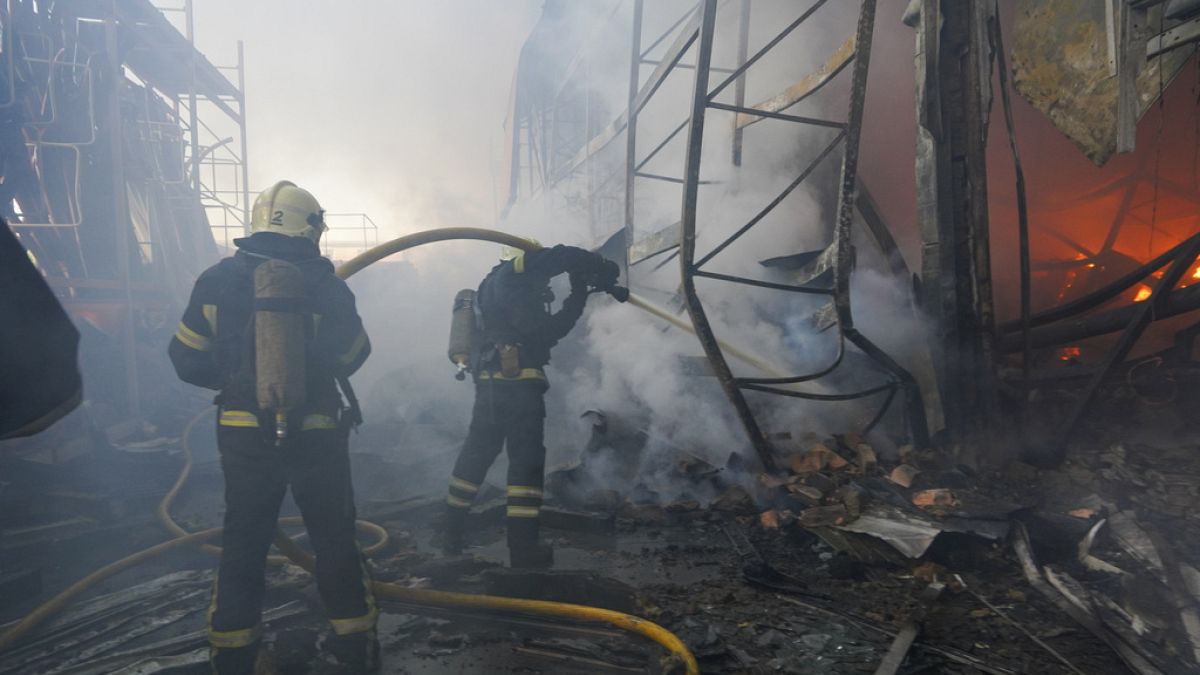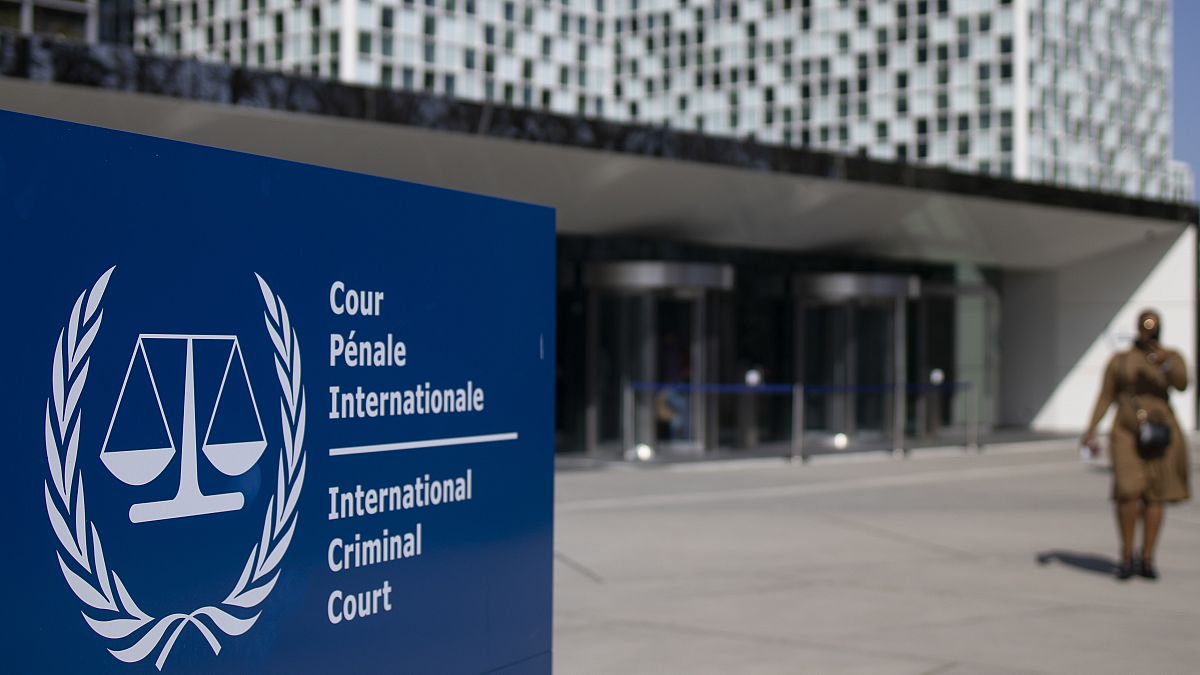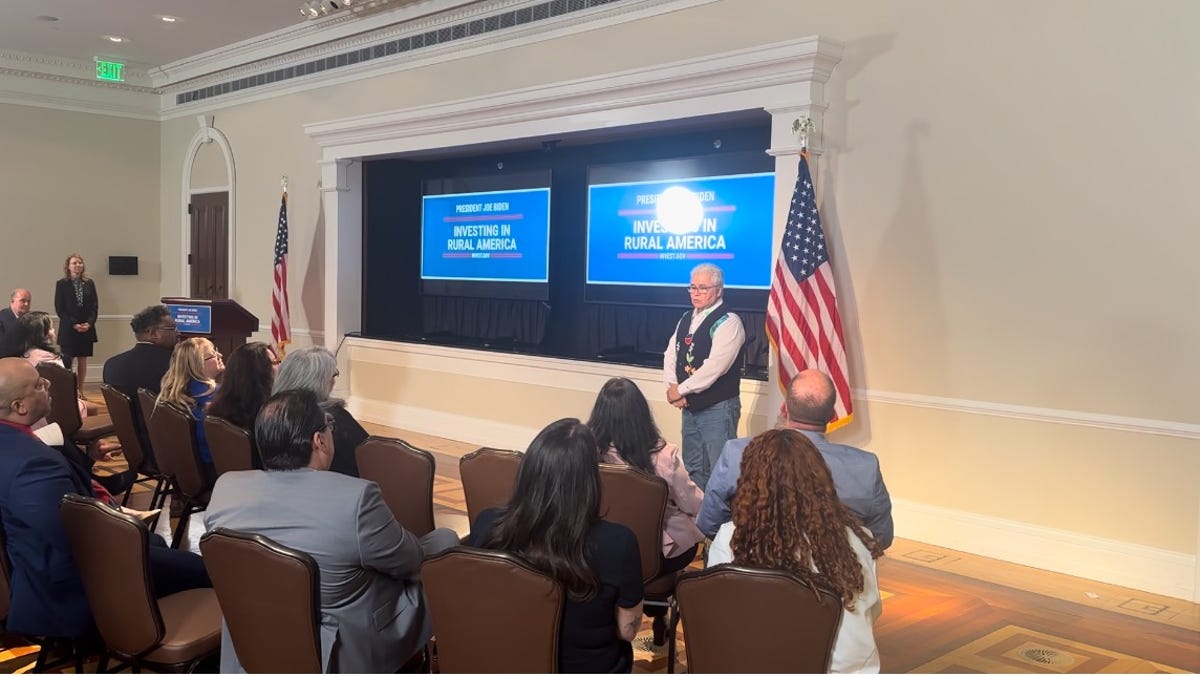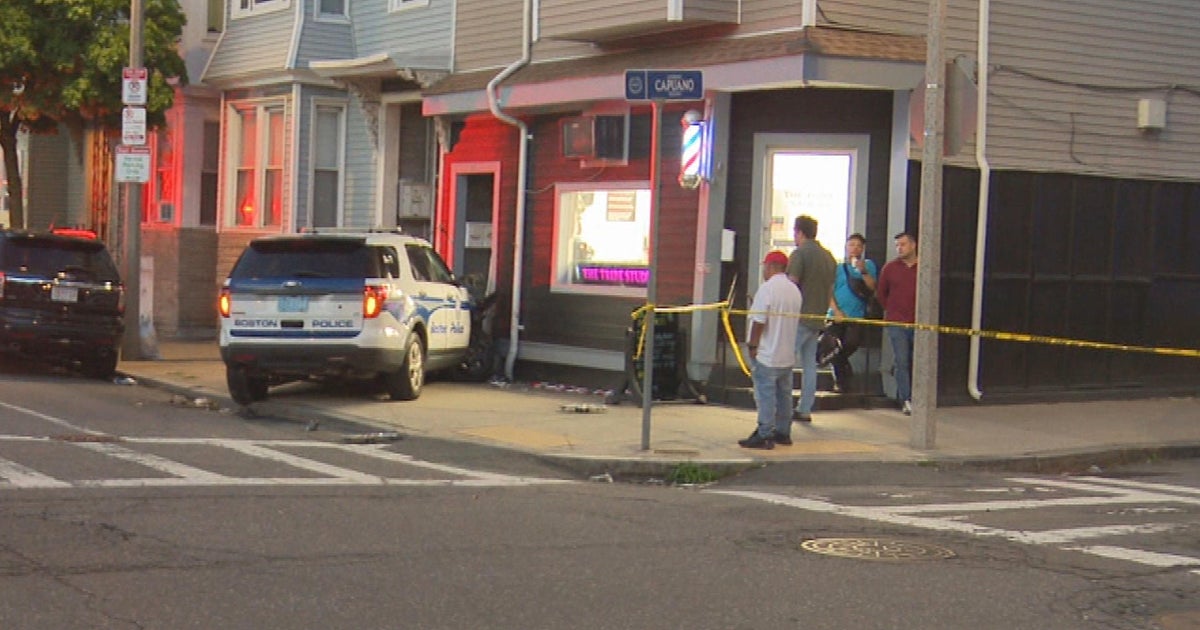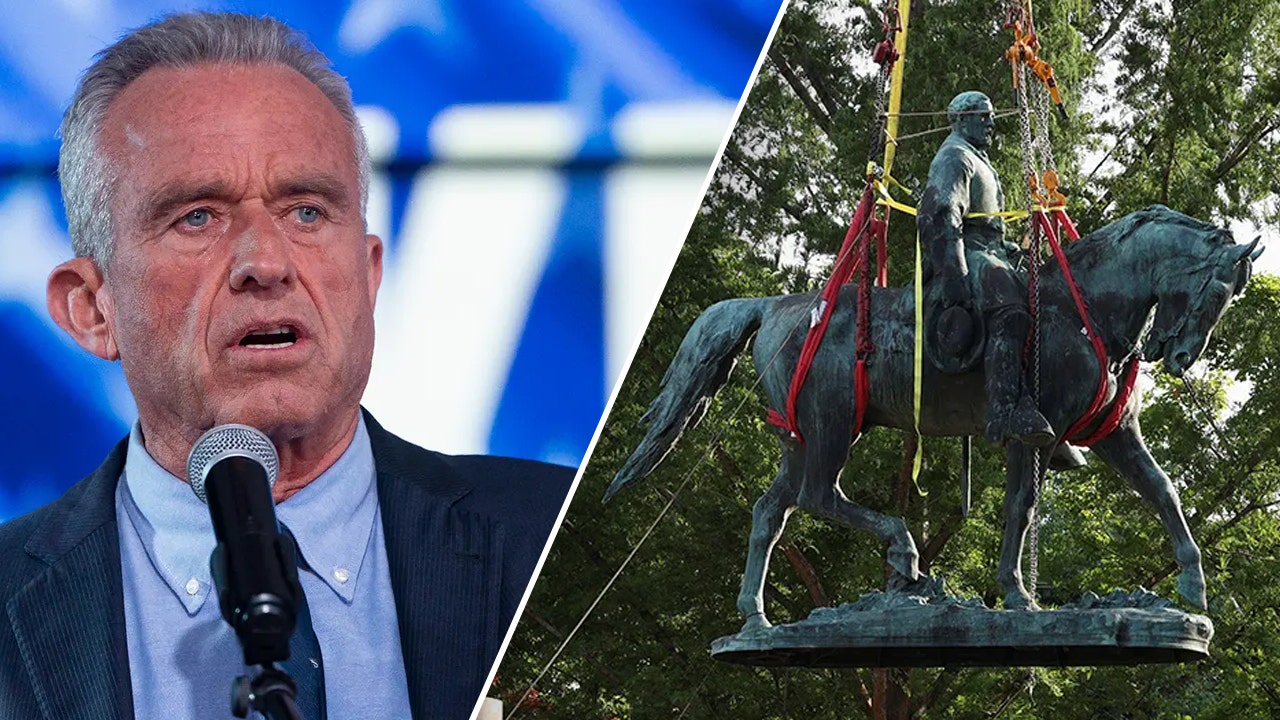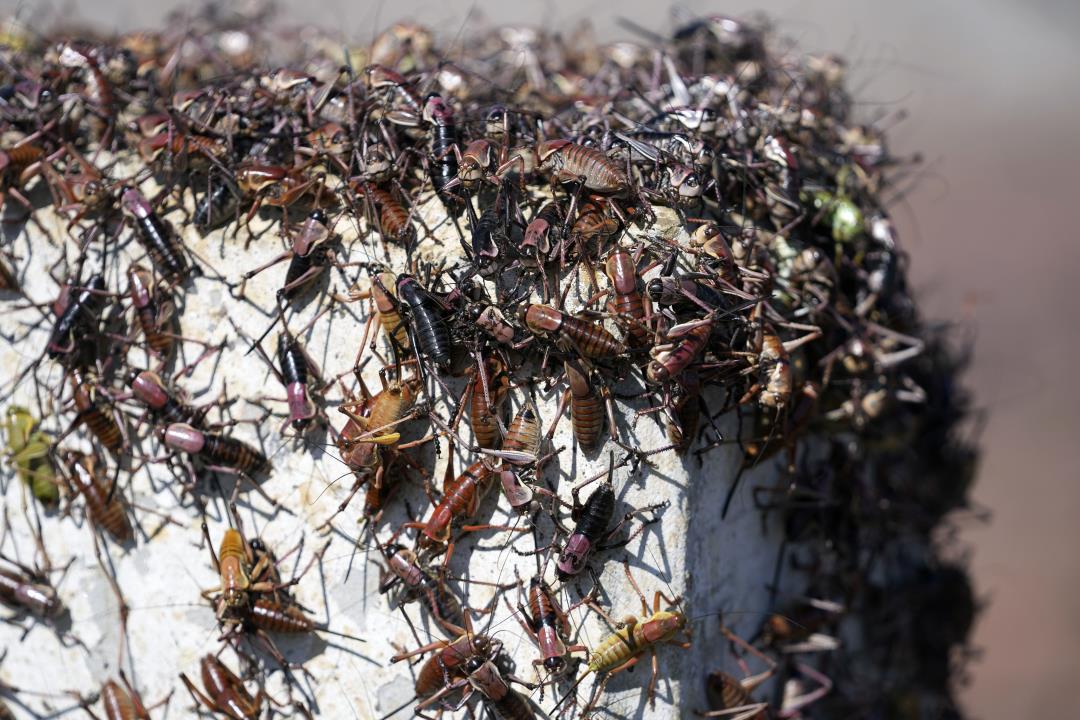World
Bans on Ukrainian grain should run until end of year: EU Commissioner
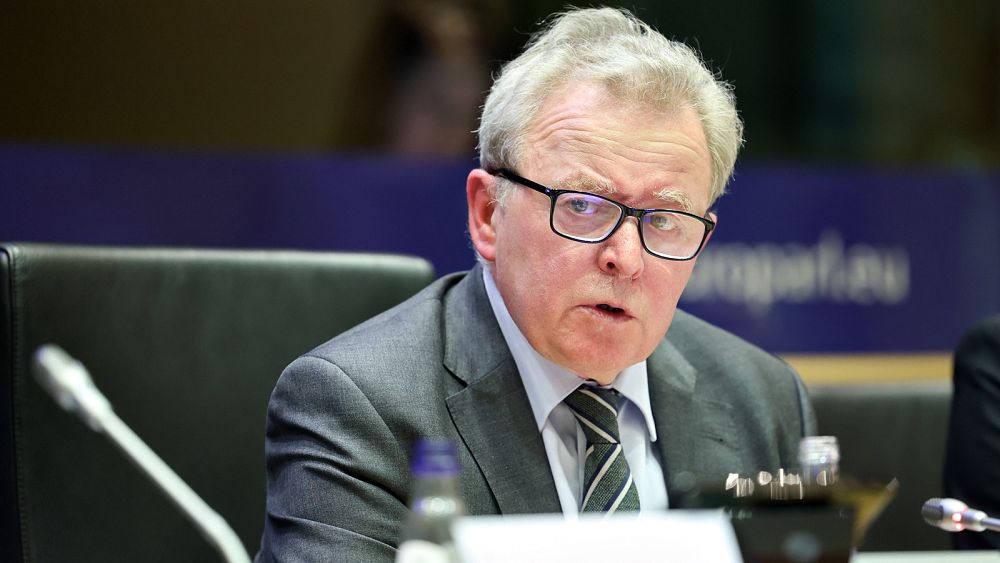
The temporary bans on tariff-free Ukrainian cereals should be prolonged until the end of the year, Janusz Wojciechowski, European Commissioner for agriculture, has said in comments that contradict the executive’s line.
The prohibitions have been in place since 2 May and apply to five members of the European Union located in Ukraine’s periphery – Poland, Hungary, Slovakia, Romania and Bulgaria –, who complain the grain glut has depressed prices for local farmers.
Under the bans, four products coming from Ukraine – wheat, maize, rapeseed and sunflower – can transit through the five Eastern European countries but cannot stay inside their markets for domestic consumption or storage purposes.
The measures are extraordinary in nature and have been vigorously criticised by the Kyiv authorities, including by President Volodymyr Zelenskyy, who has called them “absolutely unacceptable.” Other EU countries, such as Germany and France, have raised serious concerns about the impact of the restrictions on the integrity of the single market.
The European Commission, which negotiated the deal in a bid to prevent uncoordinated retaliatory action from Eastern Europe member states, has insisted the bans would be definitively phased out by 15 September and efforts would then focus on improving shipping capacity, infrastructure and storage.
But on Thursday morning, Wojciechowski, who is Polish, broke ranks with the executive’s main line and explicitly endorsed the extension of the trade prohibitions until the end of the year, a timeline set to unleash Kyiv’s fury.
“My observation is this local ban is functioning well, the direct imports to these five countries stopped, but we found negative consequences, generally, for the EU market, because the imports continued to other countries which need Ukraine grain, (like) Spain, the Netherlands, Italy,” Wojciechowski told Members of the European Parliament during a hearing of the committee on agriculture and rural development.
“We can expect – this is my observation – that if this ban is not prolonged, we will have the same problem (as) before with the frontline member states.”
Wojciechowski said opening up the market in full or closing it down in its entirety were “different extremes” and suggested instead a third possible option in which the temporary bans would stay in place but with extra financial aid to boost transport.
According to the Commissioner, only 2% to 3% of Ukrainian grain is being shipped out to non-EU countries, including low-income nations in Africa, because the costs of transit are too high, rendering the operation “not economically viable.” Consequently, the majority of the cargo is staying within the European market.
“This is the main barrier: the transit is not functioning well,” Wojciechowski said.
As a solution, the Commissioner floated a new programme of subsidies to help Ukrainian companies bring their cargo to EU ports and sell them around the world. He said the subsidies should be worth between €20 and €30 per tonne of grain, depending on the final destination. This will result in a €600 million programme – paid by the EU budget – to facilitate the shipping of 20 million tonnes until the end of the year.
“The only solution is to support transit and continue the ban (until) the end of the year because after 15 September there will be huge problems, the same problem – even bigger than we had before,” Wojciechowski told MEPs.
The Commissioner underlined the plan was his “personal proposal” but said he had already discussed it internally with his colleagues in the executive and with representatives of Poland, Hungary, Slovakia, Romania and Bulgaria, as well as Ukraine.
“I do think it’s the best solution and I hope the whole Commission will look into it and give its go-ahead,” he said, switching to Polish. “The problem is tough and we need to act in a spirit of solidarity with farmers, with the member states that have suffered with the situation, but also with Ukraine.”
His personal opinion
Shortly after the parliamentary hearing came to an end, the European Commission distanced itself from the Commissioner’s comments and stressed the 15 September phase-out would go ahead as originally planned.
“First of all, underline that, as the Commissioner said this morning during the hearing with the European Parliament, he expressed his opinion. He clearly said that his views didn’t represent the Commission’s position,” said a spokesperson.
The spokesperson added work was “ongoing” to increase transport capacity through alternative routes, like the Danube river, and address the bottlenecks that fuelled last year’s surge in Ukrainian exports after the introduction of the tariff-free regime.
“All this work is done ahead of the 15th of September to be able to have a very good preparation and make sure that we can address all the issues that were raised a few months ago,” the official said.
Despite the Commission’s swift reply to Wojciechowski’s unexpected proposal, his words exposed an internal disagreement within the executive that could further muddle the explosive debate about the future of the bans.
Poland, Hungary, Slovakia, Romania and Bulgaria have already asked Brussels to extend the prohibitions until the end of the year, arguing the collapse of the Black Sea Grain initiative would inevitably increase Ukrainian exports through land routes. The five frontline countries also said the list of blacklisted products should “remain open” and possibly cover goods “other than cereals and oilseeds.” On Thursday, Wojciechowski named poultry, eggs and raspberries as goods that deserved additional scrutiny.
For Poland, the topic is particularly sensitive due to the forthcoming general election: rural voters are considered a must-have demographic for Law and Justice (PiS), the hard-right ruling party. Wojciechowski has been affiliated with PiS since 2010.
But for Ukraine, any talk of an extension beyond 15 September is a non-starter.
“This move will violate the Ukraine-EU association agreement. Most importantly, this step will go against the principle of solidarity on which the European Union is based,” Dmytro Kuleba, Ukraine’s foreign affairs minister, said earlier this week while on a visit to Prague, in response to the demands of the five member states.
“If they behave like this, they will leave us with no chance but to fiercely defend our rights and the rights of Ukrainian farmers.”

World
The toll of Beijing's security law on Hong Kong's activists
HONG KONG (AP) — Activist Chan Po-ying is permitted only 15-minute daily visits to see her husband, Leung Kwok-hung, separated by a plexiglass barrier in a highly guarded Hong Kong jail.
Leung, 68, is one of 47 activists who were prosecuted in the largest national security law case to date in the former British colony. Most of them have been separated from their loved ones for years, uncertain when they might reunite. On Thursday, 16 activists who pleaded not guilty — including Leung — will begin hearing their verdict.
The government had warned there might be legal consequences, but Chan didn’t stop former pro-democracy legislator Leung from participating in an unofficial 2020 primary election that would lead to his prosecution under a national security law that Beijing imposed on the semi-autonomous city.
“Maybe we were too naive,” Chan, 68, said with a laugh.
Charged with conspiracy to commit subversion, Leung and other defendants are accused of attempting to paralyze Hong Kong’s government and topple the city’s leader by securing the legislative majority necessary to veto budgets. The charge carries a maximum sentence of life imprisonment. Those who pleaded guilty have a better chance at shorter prison terms and will be sentenced at a later date.
“I guess almost none can be acquitted,” said Chan, who chairs the League of Social Democrats, one of the city’s few remaining pro-democracy parties. “I am not optimistic. But I also hope someone can get away from it.”
ACTIVISM IN HONG KONG
Chan was part of a wave of youth activism spreading through Hong Kong when she met Leung in a Marxist group around 1975, when the city was still under British rule.
At first, Chan viewed Leung as a “troublesome guy,” being adamant about winning every debate. Despite this, they fell in love, and their bond transcended mere romance, Chan said; they are “comrades-in-arms.”
A 2005 protest solidified their bond. The two were some of the only Hong Kongers who stayed steadfast with the overseas demonstrators, even after police deployed tear gas and threatened arrest.
“Among those who stood with us in our youth, only the two of us stayed at the site,” she said.
Activism in Hong Kong reached a peak in 2014 with the so-called Umbrella Movement, in which demonstrators used umbrellas to fend off police pepper spray in a nearly 80-day face-off. When Beijing didn’t budge, some young activists began advocating for Hong Kong’s independence.
Suppression was swift. Several pro-independence activists were blocked from joining elections, and in 2018, Hong Kong authorities banned a small pro-independence party.
Ventus Lau was among those caught in the crackdown. He was barred from running in an election in 2018, even though he renounced his pro-independence stance. But that didn’t deter him from becoming more politically active, helping organize protests in 2019 that saw generations of Hong Kongers rallying against a now-withdrawn bill that would have allowed people in the city to be extradited to mainland China.
The largest protest drew an estimated 2 million people — more than a quarter of the city’s population.
Lau, now 30, is one of the defendants who decided to plead guilty in the subversion case related to the 2020 primary. Emilia Wong, a 29-year-old feminist influencer and longtime girlfriend of Lau, supported his activism.
In those years after the Umbrella Movement was stifled, Wong remembered feeling hopeful for a more democratic Hong Kong, despite the somber mood in the city.
“2019 represented a peak of such hopes,” she said. But the high hopes were short-lived.
THE PRIMARY VOTE AND THE CLAMPDOWN
As protests waned due to mass arrests and COVID-19 restrictions, Beijing intensified its control. On June 30, 2020, the sweeping national security law was imposed. Both the Chinese and Hong Kong governments deemed it necessary to restore the city’s stability. Several political groups dissolved on the same day.
Just a week later, a city official warned that the pro-democracy primaries might violate the security law. They held the vote anyway, resulting in an unexpectedly high turnout of 610,000.
The poll, organized within the pro-democracy camp, was meant to shortlist candidates who would then run in the official election for the legislature, typically dominated by the pro-Beijing camp. They hoped that, with a legislative majority, the government would listen to their demands.
But things didn’t go as planned.
After the primary, Beijing said the vote challenged the security law that critics argue has been broadly applied to anything the government claims could threaten stability.
When police officers arrived at Wong’s home in January 2021 to arrest Lau for participating in the election, she recalled, “It felt so absurd that I had to laugh.”
That month, over 50 former lawmakers and democracy proponents were arrested under the national security law. Authorities accused them of planning to get enough people into office to indiscriminately veto budgets, grinding governmental functions to a halt, and to force the city leader to step down.
Of those arrested, 47 were charged and brought to court for days of bail hearings, during which time some were hospitalized due to fatigue and others weren’t able to shower for days. Most of the defendants were denied bail.
LIVES UPENDED
After Lau was taken into custody, Wong devoted her time to arranging food and book deliveries for him, handling media interviews about the case, organizing visits from his friends, and assisting him with his application to restart university studies while detained.
Each day left Wong feeling utterly drained as she also grappled with the shock of Lau’s prosecution. One day, upon receiving clothes worn by Lau during his detention that still carried his scent, she burst into tears.
“It was a blow to me, specifically to my personal vision of Hong Kong,” she said.
Even for veteran activists like Chan, the situation was painful. To her, 2021 was suffocating. After Leung was denied bail, Chan would find herself crying without any particular reason during her commutes.
Months after the 47 activists were prosecuted, arrests of top management at Apple Daily and Stand News — prominent media outlets known for their critical reports on the government — forced them to shut down. Dozens of civil society groups disbanded. Some of Chan’s League of Social Democrats members were also jailed.
That year, Chan wondered daily what would happen next. “I felt lonely, but I had to handle so many things,” she said.
LIFE IN DETENTION
To maintain their relationship between the limited visits, Lau has been writing Wong a letter every day since 2021, sometimes penning Canto-pop song lyrics to express his love. In return, Wong dedicated a love song to Lau on the radio for his birthday.
To Wong, staying with Lau is a natural choice. Lau signed an agreement granting her control over his affairs — a document she described as more powerful than a marriage certificate. She said she would do her best to support him.
Even behind bars, Wong said, Lau drives her to become a better person — when he picked up his reading pace, Wong followed suit. In turn, Wong offered critiques of Lau’s lyrics. Lau pursued his translation degree and Wong became a regular at the gym.
“I’m not just standing still waiting; I’ve been running all along, and so has he,” she said.
Chan said life in detention has left Leung visibly thinner and downhearted. Despite their fiery temperaments, Leung sometimes avoids arguments during their brief visits.
“He cherishes our 15 minutes together,” Chan said. “But I also feel very upset because this isn’t the real him.”
In the most optimistic scenario, it might take three to four more years to see Leung free again, Chan said. In the meantime, she continues to organize small-scale street demonstrations, despite the threat of the new national security law that critics fear will further constrict civil liberties.
Chan knows her actions might not make a significant impact, but she says persistence in their respective roles is still meaningful.
“It’s not like nothing has been achieved,” she said.
World
Ukraine's Zelenskyy is expected in Normandy for commemorations of 80 years since D-Day, Macron says
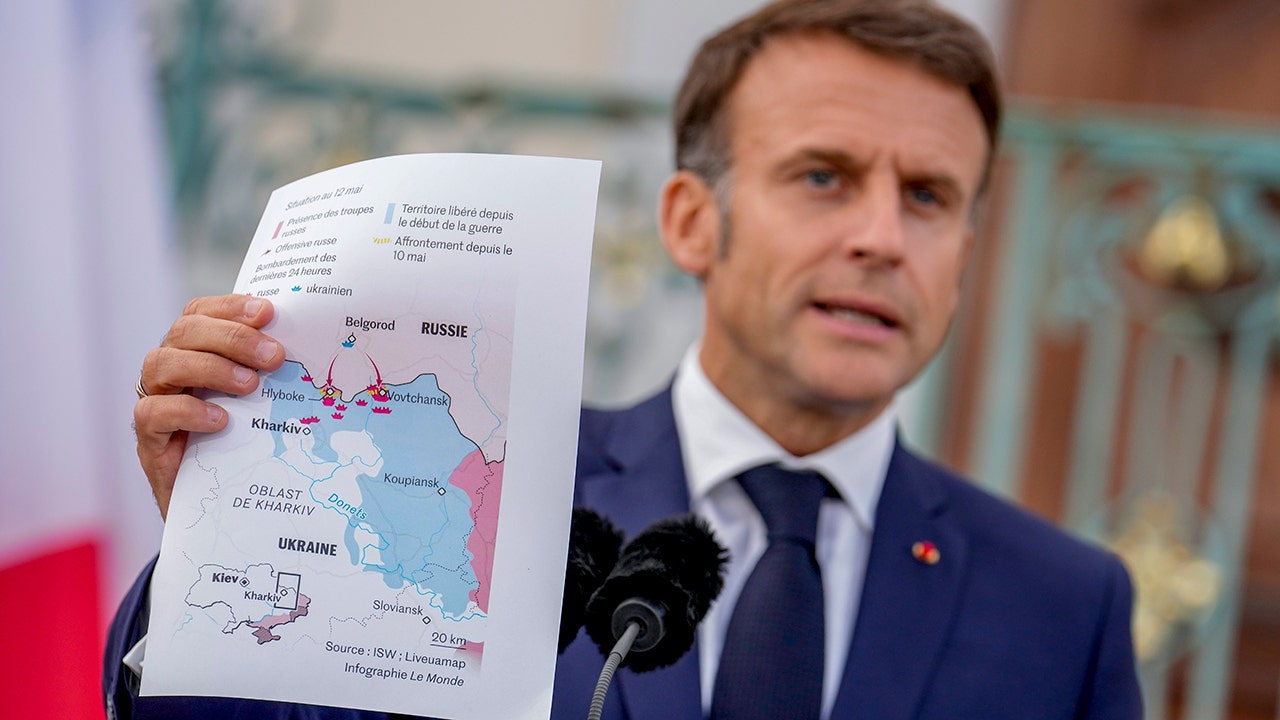
French President Emmanuel Macron said Tuesday he will greet Ukrainian President Volodymyr Zelenskyy along with other world leaders in Normandy for the 80th anniversary commemorations of D-Day.
President Joe Biden is also scheduled to attend this year’s commemorations of the landings that led to the liberation of France and Europe from Nazi Germany’s occupation.
BIDEN MISSING UPCOMING UKRAINE TALKS WOULD BE ‘APPLAUDED’ BY PUTIN, ZELENSKYY SAYS
Dozens of World War II veterans are expected to return, many perhaps for the last time, to Normandy’s beaches.
French President Emmanuel Macron shows a map during a press conference at the German government guest house in Meseberg, north of Berlin, Germany, Tuesday, May 28, 2024. (AP Photo/Ebrahim Noroozi)
An international ceremony at Omaha Beach will honor the nearly 160,000 troops from Britain, the United States, Canada and other nations that landed in Normandy on June 6, 1944.
Macron said during a visit to Meseberg, Germany, on Tuesday that he will elaborate on Paris’ support for Ukraine next week, when Zelenskyy visits for the D-Day events.
France will “do whatever is necessary for as long as it is necessary” to support Ukraine, he said.
Canada’s Prime Minister Justin Trudeau is also to attend the D-Day commemorations.
Britain’s King Charles III, who continues to be treated for cancer, also plans to travel to France for the British ceremonies, while skipping the international ceremony. The Prince of Wales will instead stand in for the king at Omaha Beach.
World
Former spy chief expected to be new prime minister of the Netherlands
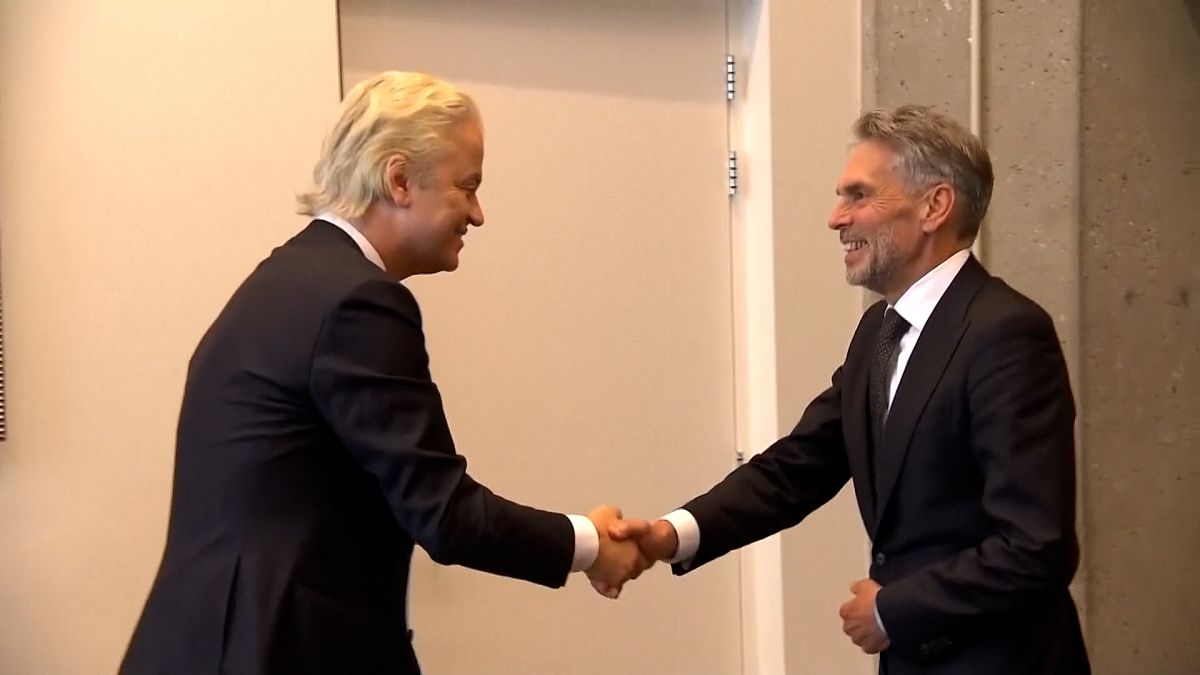
It has taken months of post-election negotiations to form a right-wing government.
A former spy chief was tipped as the new Prime Minister of the Netherlands.
Former head of the Dutch spy agency and counter-terrorism office Dick Schoof was tipped on Tuesday to become the nation’s new Prime Minister.
The 67-year-old will lead a coalition dominated by Geert Wilders’ radical right-wing Freedom Party.
The coalition is also made up of the centre-right People’s Party for Freedom and Democracy, centrist New Social Contract and the Farmer-Citizen Movement.
Schoof is currently the top civil servant at the Ministry of Security and Justice.
Wilders congratulated him in a post on X, saying he “has a great track record, is non-partisan and therefore above the parites, has integrity and is also very likeable.”
Anti-Islam firebrand Wilders, who topped the polls in last year’s elections, struck a deal with the other party leaders earlier this month – capping months of negotiations that left it unclear who would become the new Dutch prime minister.
The new agreement, framed with the slogan “Hope, courage and pride”, includes plans to impose strict measures on asylum seekers, scrap family reunification for refugees and reduce the number of international students studying in the country.
At one point, the 26-page document says the government will seek to “deport people without a valid residence permit as much as possible, even forcibly”.
Wilders’s preferred candidate for prime minister withdrew last week following allegations he had been involved in medical patent fraud.
-

 Movie Reviews1 week ago
Movie Reviews1 week ago‘The Substance’ Review: An Excellent Demi Moore Helps Sustain Coralie Fargeat’s Stylish but Redundant Body Horror
-

 Movie Reviews1 week ago
Movie Reviews1 week ago‘Rumours’ Review: Cate Blanchett and Alicia Vikander Play Clueless World Leaders in Guy Maddin’s Very Funny, Truly Silly Dark Comedy
-

 Culture1 week ago
Culture1 week agoFrom Dairy Daddies to Trash Pandas: How branding creates fans for lower-league baseball teams
-

 News1 week ago
News1 week agoVideo: A Student Protester Facing Disciplinary Action Has ‘No Regrets’
-

 Movie Reviews1 week ago
Movie Reviews1 week ago‘Blue Sun Palace’ Review: An Intimate, Affecting and Dogma-Free Portrait of Chinese Immigrants in Working-Class New York
-

 World1 week ago
World1 week agoPanic in Bishkek: Why were Pakistani students attacked in Kyrgyzstan?
-

 Politics1 week ago
Politics1 week agoAnti-Israel agitators interrupt Blinken Senate testimony, hauled out by Capitol police
-

 Politics7 days ago
Politics7 days agoMichael Cohen swore he had nothing derogatory on Trump, his ex-lawyer says – another lie – as testimony ends
